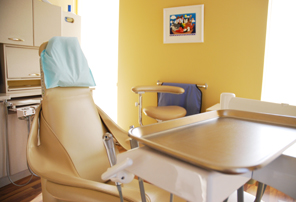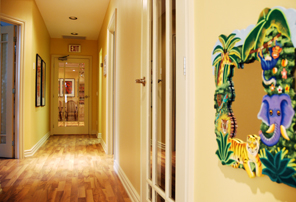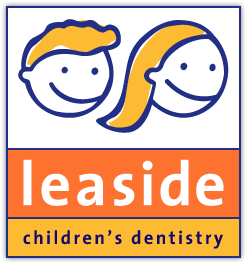Services We Provide
We are dedicated to providing our patients with preventative, restorative and orthodontic services in a comfortable and caring environment.


Diagnostic Services
Before providing any dental treatment, we need to become familiar with your child and your family. This involves:
- taking a detailed medical, dental and family history;
- completing a thorough head, neck and oral examination
- taking radiographs if needed using specialized tests as required to assess the risk for dental diseases
Preventive Services
We offer:
- effective tooth brushing and flossing instruction;
- nutritional information about diet and dental diseases;
- dental cleanings (scaling and polishing);
- preventive treatment for oral habits;
- space maintainers;
- fluoride treatments in office and for home;
- pit and fissure sealants;
- custom-made athletic mouth guards for children playing sports.
Nitrous Oxide and Oral Sedation Anaesthesia
Keeping your child safe and comfortable during his/her dental treatment is a responsibility we take very seriously. We recommend local anaesthesia for all invasive dental procedures. We are certified and fully qualified to provide:
- nitrous oxide and oxygen inhalation sedation;
- oral sedation.
Nitrous Oxide Inhalation Sedation
Nitrous oxide, also known as laughing gas, is most often used for children who are mildly or moderately anxious or nervous. It eases their fears so that they can relax and receive treatment comfortably and safely. Nitrous oxide is administered by placing a small mask over your child's nose. Your child will smell a sweet, pleasant aroma and experience a sense of well-being and relaxation. As the gas begins to work, the child becomes calm, although he or she is still awake and can talk with the dentist. When the gas is turned off, the effects of sedation wear off almost immediately. If your child is worried by the sights, sounds and sensations of dental treatment, he/she will respond more positively with the use of nitrous oxide and oxygen.
Oral Conscious Sedation
Children who are more anxious may need an oral medication that is stronger than nitrous oxide. When choosing a medication, we will consider your child's anxiety level, his or her ability to cooperate and the treatment required. With oral sedation, your child may be sleepy but can be aroused if necessary and can respond to simple commands. Minor side effects such as nausea or vomiting can occur with some medications. Before a visit in which your child is to receive oral sedation, you will receive instructions about eating and drinking, what to expect and what to watch for after treatment. Some children may not accept treatment in office. In these cases, arrangements can be made for dental treatment under general anaesthesia in a hospital setting.
Restorative Dentistry
For small cavities in primary or permanent teeth, we offer:
- tooth-coloured, preventive resin fillings;
- fluoride-releasing white fillings;
- silver amalgam fillings.
For badly decayed primary teeth that will not hold a filling, we provide:
- stainless steel crowns for back teeth;
- tooth-coloured resin crowns for front teeth
Interceptive Orthodontic Treatment
Pediatric dentists have in-depth knowledge of the growth and development of your child's teeth, mouth and face. We can correct simple abnormalities in tooth and jaw position using:
- removable orthodontic appliances;
- fixed orthodontic appliances;
- functional orthodontic appliances.
Early diagnosis and proper treatment can pay dividends in improved dental health and in avoiding future dental problems.
Root Canal Treatment/Pulp Therapy
Some primary or permanent teeth require treatment of infection inside the tooth or the jaw. The most common procedure is the "pulpotomy" or baby root canal which removes the infected pulp tissue within the crown of the tooth. A medication is placed to calm the nerve of the tooth and prevent bacterial growth. The pulpotomy is followed with a final restoration such as a stainless steel crown. After the "pulpotomy" (root canal procedure) is complete, your child should feel much better. This treatment alleviates the pain from the tooth and helps retain the natural tooth, which, in the long run, means natural function, natural appearance, and less costly treatment over the long term.

